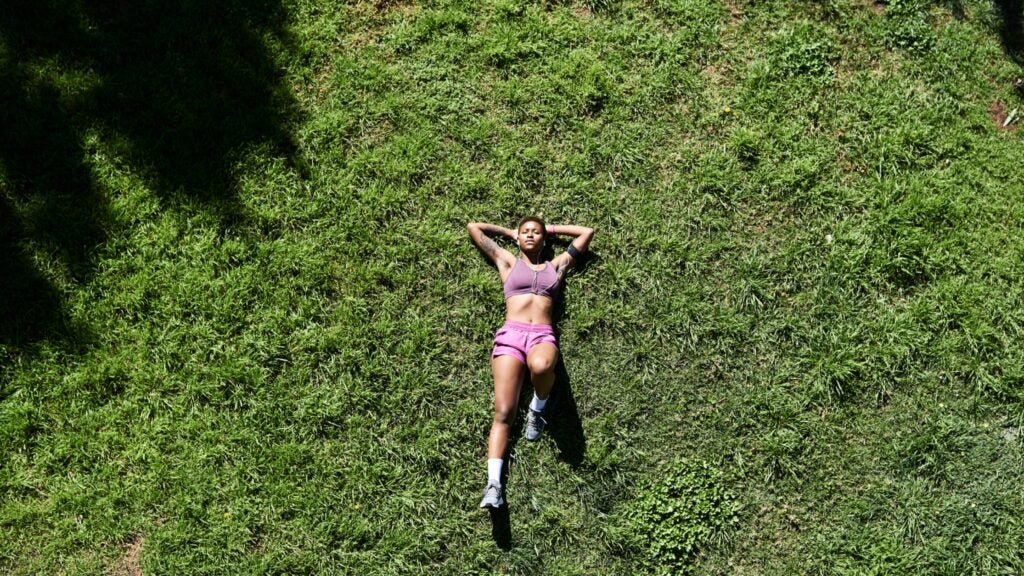
Spending per week in mattress, à la John Lennon and Yoko Ono, may sound idyllic. However there’s loads of analysis displaying that the affect in your health and well being might be brutal. In a single 2016 research, younger males who spent per week in mattress misplaced 3.1 kilos of muscle, and their VO2 max and most energy declined by 6.4 and 6.9 p.c, respectively. Individuals spend months, and even years, making an attempt to make beneficial properties of that magnitude, however you possibly can lose it in per week.
The image could also be even worse for well-trained athletes. Research discover that these with the very best preliminary health ranges undergo the best losses throughout mattress relaxation. Generally there’s no avoiding it, although: surgical procedure, accidents, and diseases—together with, notably, COVID—can confine even the fittest athletes to mattress. So a brand new systematic overview within the journal Sports activities Medication, from researchers Barry Spiering, Jonathon Weakley, and Iñigo Mujika, takes a better take a look at how mattress relaxation impacts skilled athletes, and methods to decrease its unfavorable impacts.
The primary discovering is simple to sum up. An in depth search of 4 databases turned up an preliminary batch of 501 research health losses throughout mattress relaxation, of which a grand whole of zero concerned extremely skilled athletes. This isn’t notably stunning: for those who’re a severe aggressive athlete, are you going to volunteer for a research that may most likely strip you of months of coaching beneficial properties? Nonetheless, Spiering’s foremost takeaway is that scientists ought to research this query extra. If randomized trials aren’t possible, it ought to nonetheless be attainable to reap the benefits of conditions the place athletes are pressured to take full relaxation, for instance after surgical procedure, and do some detailed measurements of how rapidly their health declines and the way lengthy it takes to regain.
Within the meantime, the researchers did discover seven research involving athletes labeled as “Tier 2: Skilled/Developmental,” which is a notch above recreationally energetic, enabling them to extrapolate some tentative conclusions about what occurs to extra severe athletes.
One key discovering was that endurance begins to say no inside about three days. The preliminary fast decline is related to a drop in blood plasma quantity, whereas the following gradual decline displays bodily adjustments in your coronary heart, circulatory system, and muscular tissues. There’s a small physique of literature suggesting which you can struggle the preliminary decline by taking in further fluid and salt to protect your plasma quantity. The research use a each day dose of 30 milliliters of water and 0.1 grams of salt for every kilogram of physique weight (that’s about two ounces of water per pound), beginning per week or extra earlier than mattress relaxation begins. The proof for that is intriguing however not but definitive.
Muscle energy begins to say no inside 5 days. On this case, there’s an preliminary fast decline ensuing from neuromuscular adjustments in how alerts journey from the mind to the muscular tissues, then a slower decline as your muscular tissues begin to shrink. To struggle the neuromuscular decline, you possibly can strive motor imagery coaching, which principally includes imagining your self doing energy coaching. As far-fetched as this sounds, there’s a strong physique of literature displaying that it really works, together with a Scottish basketball group that did imaginary energy coaching through the preliminary phases of the COVID lockdown.
To take care of your muscle mass, there are a bunch of attainable ways. You possibly can have a machine transfer your limbs for hours at a time, use blood-flow restriction, or apply electrical stimulation to your muscular tissues—which helps stave off muscle losing even in critically unwell sufferers who’re comatose. It’s additionally essential to get sufficient protein, notably since you’ll seemingly be consuming lower than regular whereas confined to mattress. Spiering and his colleagues cite a suggestion of 16.5 grams of important amino acids plus 30 grams of carbohydrate, thrice per day. In response to muscle researcher Luc van Loon, the simplest approach to stimulate muscle development and upkeep is the mix of ingesting protein and utilizing your muscular tissues—so for those who’re capable of get away from bed in any respect, do it while you’re consuming, since even shuffling down the corridor to the kitchen will assist your muscular tissues make higher use of the lunch you eat.
There are another nuances, just like the adjustments in blood strain and distribution that consequence from extended mattress relaxation. If you’re standing up, gravity pulls your blood down into your legs. If you’re mendacity down, it will get redistributed to your torso—and your physique ultimately will get used to that new regular, in order that while you lastly get away from bed and gravity kicks in, you get a head rush since you don’t have sufficient blood strain to maintain your mind provided with oxygen. One countermeasure borrowed from analysis into how astronauts deal with zero-gravity spaceflight is lower-body unfavorable strain, a fancy process that principally includes placing your legs right into a specifically designed field from which the air is pumped out, drawing blood from the core into the legs and simulating the consequences of gravity. That is most likely extra bother than it’s value for those who’re simply in mattress for per week with COVID, however is a cool-sounding thought and might be helpful for extended mattress relaxation.
The ultimate piece of the puzzle is how lengthy it’s best to count on to take regaining your health. Given the absence of research on aggressive athletes, it’s unattainable to present any agency solutions. Research on non-athletes recommend that it takes a few week to counter the endurance losses of a two-week mattress relaxation, and two weeks to regain neuromuscular perform after a four-week break. Nevertheless it’s attainable that athletes, with their greater preliminary health, may take longer to regain these heights. Spiering and his colleagues give a basic guideline of two to 4 weeks of progressive rehabilitation after a break of as much as 4 weeks, however the particulars will rely on the circumstances and the explanation for the break.
All of that is necessary to aggressive athletes who, for one purpose or one other, get caught in mattress for a couple of days or extra. Nevertheless it’s additionally of curiosity to anybody who plans to get previous. The “catabolic disaster” mannequin of growing older means that muscle mass doesn’t decline easily and step by step; as a substitute, we lose disproportionate quantities throughout temporary intervals of whole inactivity. Being caught in mattress is rarely enjoyable, and I can’t say that the prospect of mainlining protein and slogging by way of units of imaginary push-ups whereas I’m there guarantees to enhance the expertise. However I’m beginning to assume that it’s higher than the choice.
For extra Sweat Science, be part of me on Twitter and Fb, join the e-mail publication, and take a look at my e book Endure: Thoughts, Physique, and the Curiously Elastic Limits of Human Efficiency.
Supply Hyperlink : fastenersgod.com
